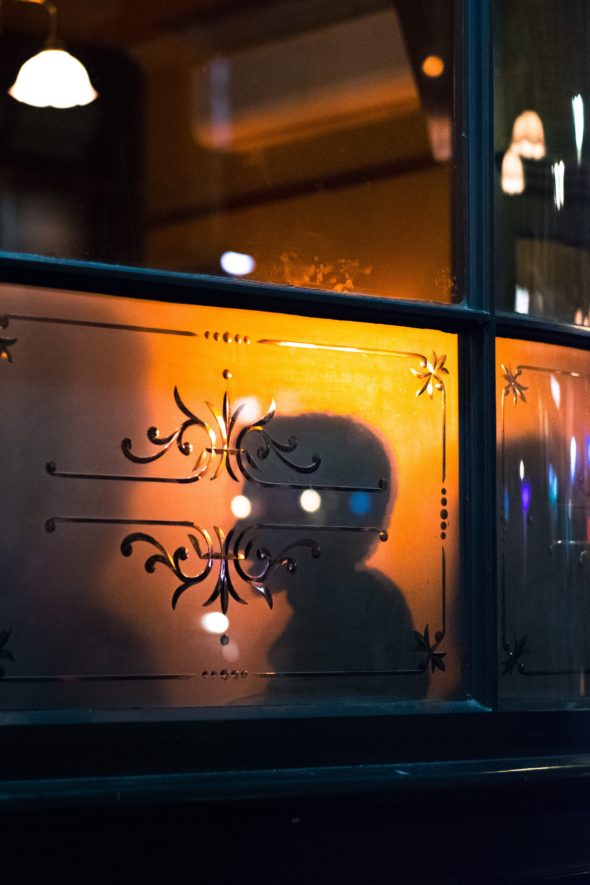
We asked for your literary rejection horror stories, many of you submitted them, and the result was terrifying (re. just right). Thanks to everyone, including many editors, for provoking panic and drawing out dread.
Here are a few of our favorites:
Getting Ahead
by Josie Turner
A while ago, a literary magazine rejected my speculative / horror short story. I usually react to rejection – which is not uncommon – with a jaunty jig, a gin and tonic, and a cathartic howl in the dead of night. But not this time. Because on this occasion my story – about the unforeseen consequences of a head transplant – was rejected by a reader who identified himself as a doctor, and denounced my story as unrealistic.
Unrealistic.

Yes, apparently my tale of an affable family man who wakes up with his head grafted onto the gnarled ‘donor’ body of a criminal was not entirely within the bounds of probability. It might even have breached medical ethics – I don’t know; Dr. Critic didn’t go into details. Had I known that my story would be screened by a physician I might have undertaken a decade or so of medical training to ensure authenticity. But like the amateur I am, I was swayed by the possibilities of speculative fiction, and press reports of research into the possibility of such transplants. I was intrigued by the terminology – after all, a transplant would not involve the acquisition of a head so much as the loss of a familiar body. What makes a person? Who does a body belong to? Can anyone accept their loved one’s consciousness in another form? ‘Same engine, different car’ as my protagonist’s family assure themselves.
But no. It was unrealistic. Quite possibly, in that reader’s mind, I am some sort of Dr. Moreau, splicing my acquaintances into chimerical forms and then bothering literary magazines with the results, as though I’m writing up medical experiments.
I resolved not to submit to that particular magazine again, in case Mount Etna is drafted in to deem my volcano story insufficiently molten, or the International Space Station is called upon to find my astronaut story earth-bound.
Although I am tempted to submit an extract from ‘Frankenstein’. Creative non-fiction, of course.
***
 Josie Turner lives in a small town outside London, and works for the UK’s National Health Service. She has had short fiction published in journals including Mslexia, Mechanics Institute Review Online, Luna Station Quarterly and Noble/ Gas Qtrly. In 2016 she won the Brighton Short Story Prize and received the Sue Lile Inman Award for Fiction from the Emrys Foundation.
Josie Turner lives in a small town outside London, and works for the UK’s National Health Service. She has had short fiction published in journals including Mslexia, Mechanics Institute Review Online, Luna Station Quarterly and Noble/ Gas Qtrly. In 2016 she won the Brighton Short Story Prize and received the Sue Lile Inman Award for Fiction from the Emrys Foundation.
Twice Bitten
by Tamzin Mitchell
I opened the email to find words that no MFA applicant hopes to see: We regret to inform you that your application was not successful and you have not been recommended for an offer of admission. Another rejection for my file.
But wait just a minute: this was not just another rejection. It was the middle of August, long past when MFA decision letters had gone out—in fact, I was weeks away from starting an MFA program elsewhere—and I was pretty sure this first program had already rejected me.

I trawled the depths of my email archive, and there it was, dated early March: I am writing to let you know that the selection process…did not, unfortunately, lead in your case to an offer of admission. Not only had they rejected me twice, but they’d done so with two entirely different form letters (complete with two separate “good luck to you and never darken our doorstep again” closing lines).
Usually I like to think of myself as a pretty rational person—I know a clerical error when I see one. But another part of me couldn’t help but remember the stories I’d heard, in boarding school and then in college, about would-be students who hadn’t been accepted showing up on move-in day and refusing to budge until they’d been assigned a room. Maybe this program feared that. Maybe they wanted to make extra sure that I didn’t show up in September. This was the more interesting narrative, so it was the one I preferred.
To a writer—or an aspiring writer—rejection is the norm. Some amount of rejection is preferable, even: if I ever make it to a point where most of the essays and short stories I send out are accepted right away, I’ll know that either I’ve made it or, more likely, I’m aiming too low. In 2016, Kim Liao shared her goal of amassing 100 rejections a year. “Since I’ve started aiming for rejections,” she writes, “I no longer dread submitting.” Literary Hub published this piece a year after my double rejection, and it articulated something I had vaguely grasped at: take the rejection to heart only insofar as it improves your writing, adjust your aim, and keep going.
One MFA program sent me not one but two rejections for the same application. Others sent me only a single rejection—surely a step up. And I found a program that was both a good fit for me and willing to offer me a spot. My writing has improved, and now I’m making a run at literary journal rejections. I trust I’ll be able to say the same in a year, or five years, or ten.
***
 Tamzin Mitchell is a proofreader and editor currently based in Toronto. She holds an MFA from the University of New Hampshire, and her work has appeared or is forthcoming in Five on the Fifth, The Vignette Review, and Not One of Us.
Tamzin Mitchell is a proofreader and editor currently based in Toronto. She holds an MFA from the University of New Hampshire, and her work has appeared or is forthcoming in Five on the Fifth, The Vignette Review, and Not One of Us.
Rejection, A Horror Story
by Kimberly Smyth

I was working at my desk late one night
Across my email came a dreadful sight
“Rejected Again!” The nasty thing said,
Actually, “We regret to inform you” instead
I hung my head in utter shame,
Outside the wind howled in the driving rain.
Lightning struck and thunder shook,
How will I ever write a book?
I thought as I pondered the cause
Number ten rejection I believe this was,
A blow to my ego, simply because
I’ve been trying so hard, has my talent fled?
Have I never had it at all
My conscious said.
This was just an essay, I’ve penned many of those
It shouldn’t have failed, not exactly prose.
If I can’t pass this easy test
No way I’ll ever become the best
At writing a book or a novel so well
All these rejections have put me through Hell.
Again and again, how much can one take?
This last one I got really took the cake.
An emotional story about my mother,
Rejected, just like all of the others.
Outside the storm continued to rage,
As I sat there in my four-walled cage.
The room where the “magic” is supposed to happen
Nothing like that, just another rejection.
I erased the email so fast I forgot
Just which pub this letter was from, it mattered not
I was about to get numb
To this feeling I thought as I put it to bed
And off I went to search my head
There must be an answer or clue I am missing,
Suddenly my husband I was kissing,
He told me it would surely get better
Next time I’d get an acceptance letter
“You really think so,” I asked through my tears
“Of course, you’ve been writing for all of these years!”
He said and I calmed for just the time being.
Inside I was really falling apart
These editors have stuck a knife in my heart,
They are all monsters I thought with a start.
They’re out to get me, that’s the truth of it,
Now I was so mad I could spit.
No way will they make this writer quit.
In the morning I’ll start with a tale to regale,
It will be great, my ship has not sailed.
So I set about writing a most epic story,
Soon I thought maybe I’ll see all the glory.
I worked night and day and I sent the thing off
Surely the editors this time will not scoff.
Instead of fresh hell this one will be heaven,
Yet about one month later, came number eleven.
***

Kim Smyth is a freelance writer/blogger living in the DFW metroplex with her hubby Dave and two adorable Shorkies, Whiskey and Brandy. Visit her at her blog Kimmy’s Patio where she dishes on most anything but specializes in alternative health.
Personalized Rejection
by Michael Harris Cohen
Two men stand at my door. One thin, one fat, both in grey suits. Neither smiles.
“Apologies for hammering on your door,” the thin one says. “We tried the doorbell.”
“It’s broken,” I say. “Been meaning to fix it.”
The fat one nods and pulls a notebook from his pocket. He flips it open and jots something down. The thin man peers at his scribbles then looks back at me with a brisk smile. I’m suddenly aware I’ve answered the door in my writing clothes—coffee-stained sweatpants and a loose sweatshirt. I tuck my hands under my armpits.

“Can I help you?”
“You’re Thomas Lane?” The thin man says.
I nod.
“We’re with Monolith literary magazine. May we come in?”
My heart drum rolls. I’ve been trying to land a story in Monolith for years. The magazine is my Everest. It’s a literary mountain I could paper with all the form rejections they’ve sent me. I step back; they enter.
The thin man settles on my couch, while the fat one starts combing my place as if he’s investigating a crime scene.
He scans my books. His head angled over the spines like a bird hunting a bug. He takes notes. He moves to my bedroom, peeling back the blanket to examine the sheets.
He tests the firmness of my mattress with a spread palm. He takes notes. He glances at my writing desk, and then quickly moves to the kitchen.
There he opens my fridge and inspects its lonely occupants. I find myself wanting to explain the moldy and half-eaten sandwich, the pickle jar vacant of all but juice. He takes notes again, does a quick search of the cupboards, takes more notes, and rifles through the drawers. He pulls out my meat cleaver and tests the blade with his thumb.
For the first time he smiles.
Meanwhile, the thin man has spread papers on the coffee table in front of him. The fat one waves the cleaver and nods, and the thin man clears his throat picking up the papers.
“Mr. Lane. Do you know how many stories you’ve submitted to Monolith in the last four years?”
“Maybe 10? 12?”
He looks at his papers. “In fact, 19 stories, since November, 2007.”
He flips some pages in his hand toward me. I read a title, “The Half Life of Loss.” It’s my story. The last I sent, more than four months ago.
“You submitted this?”
I nod. Unable to speak. I sit on the other end of the couch, spun in a wave of suddenly possible futures. An acceptance from Monolith rolls out the carpet for agents and book deals. I’ll publish my novel. I’ll finally emerge from the limbo of emerging writer. My costly MFA will at last justify itself in the face of my mother.
The thin man hands my story to the fat man. He sets down the cleaver and shuffles through the pages until he reaches a highlighted passage. He reads from a spot a few pages into my story; it’s the moment after the husband commits his wife to the asylum.
“They replaced my clothes and cut my hair. The pattern of fallen hair made me think I might, after all, be insane: I saw a galloping horse; My dead grandmother waving goodbye; The Kanji character for “sly,” which I knew because my mother had it tattooed on her forearm. All that and more I saw at my feet…”
The fat man’s voice is rich and deep. I like the sound of my words in his mouth. Abruptly he stops and looks at me. His stare is neither friendly nor encouraging. The thin man on the couch holds a similar expression. I suddenly realize this might not be an acceptance.
 “Do you know why we’re here?” The thin man says.
“Do you know why we’re here?” The thin man says.
I uncross my legs, then recross them the opposite way. “To accept my story?”
The thin man smiles thinly. He looks at the fat man who shakes his head. There’s weariness in his slow shake. Like the two of them have been through this a thousand times. Like they’re terminally bored.
“No Mr. Lane,” the thin man says. “We are not here to accept your piece. This is what we at Monolith call a personalized rejection. It’s called for on certain occasions.”
He nods to the fat man, who steps to the center of the room and reads from a different paper.
“Monolith is one of the finest literary magazines in the English language. We at Monolith uphold the highest literary standards and accept work from both established and emerging writers. We receive over 2000 submissions a month and, of these, we accept less than 1%. Our editorial staff…”
It’s word for word the language on their submission page. I tune out his rote spiel as the familiar feeling of rejection covers me like a lead blanket.
The fat man finishes the submission guidelines and switches to another page. He continues reading, his voice less official. I can tell he enjoys this part more.
“The following questions should be answered as truthfully as possible. A simple yes or no will suffice. Understood?”
“Yes?” I say. Though I don’t, not really.
“Have you ever been married?”
“No.”
“Have you ever been committed to an asylum?”
“No.”
“Have you ever been a woman?”
I laugh, but the stare both of them give me freezes the chuckle in my throat.
“No. I’ve never been a woman.”
The thin man leans toward me on the couch. “Yet, you think you can write a story from a woman’s point of view. A married woman, who winds up committed. Correct?”
I nod. Speechless.
The fat man rattles the paper. “Should I go on?” he says to the thin man who stares at me. The thin man waves his hand as though shooing a fly.
 “The rest are standard literary offenses,” the fat one says. “Forced prose, lack of narrative tension, derivative style, excessive use of semi-colons, an abundance of weak figurative language, etc. All in all, with your previous 18 submissions, you’ve violated what we at Monolith refer to as our Seven Literary Directives. You, Mr. Lane, have broken all of them. Repeatedly. In fact, we’ve had to develop three new ones, specifically for your work. Bringing the total to ten violations.”
“The rest are standard literary offenses,” the fat one says. “Forced prose, lack of narrative tension, derivative style, excessive use of semi-colons, an abundance of weak figurative language, etc. All in all, with your previous 18 submissions, you’ve violated what we at Monolith refer to as our Seven Literary Directives. You, Mr. Lane, have broken all of them. Repeatedly. In fact, we’ve had to develop three new ones, specifically for your work. Bringing the total to ten violations.”
My throat is dry. I want to get up for a glass of water but I’m somehow certain I’m not supposed to move. I shrug and croak out, “I’m doing the best I can.”
The thin man laces his hands. His eyes go steely. “For some writers, the best they can do is to not write at all.”
The fat man reads the last section of the sheet, his voice formal again. “For violation of all seven directives, plus the three unique to your work—for a total of ten—a penalty must be paid.”
The thin man moves with surprising speed, catching my wrist and yanking me to the carpet. He’s astonishingly strong for one so thin. I try to resist and he pops me in the jaw. I taste blood in my mouth and my body goes limp. He pulls me forward on my knees and slaps my palm down on the coffee table.
From the corner of my eye I see the fat man again holds the cleaver. Now he’s smiling, really smiling. Like he’s reached the part he likes the most.
“Ten violations, ten fingers,” the fat one says. “Sometimes things work out perfectly.”
***
 Michael Harris Cohen does find personalized rejections the most painful but, miraculously, still possesses all ten of his digits. His work is published or forthcoming in various places including Fiction International, Catapult’s The Gigantic Book of Tiny Crimes, The Dark Magazine and Conjunctions (web). He’s a recipient of a Fulbright grant, the Modern Grimmoire Literary Prize, and fellowships from the Atlantic Center for the Arts, Jentel, The Djerassi Foundation and Art OMI’s Ledig House. His first book, The Eyes, was published by the once marvelous but now bankrupt Mixer Publishing. He lives and teaches in Bulgaria.
Michael Harris Cohen does find personalized rejections the most painful but, miraculously, still possesses all ten of his digits. His work is published or forthcoming in various places including Fiction International, Catapult’s The Gigantic Book of Tiny Crimes, The Dark Magazine and Conjunctions (web). He’s a recipient of a Fulbright grant, the Modern Grimmoire Literary Prize, and fellowships from the Atlantic Center for the Arts, Jentel, The Djerassi Foundation and Art OMI’s Ledig House. His first book, The Eyes, was published by the once marvelous but now bankrupt Mixer Publishing. He lives and teaches in Bulgaria.
Note: The opinions expressed by guest bloggers at the Submittable blog are theirs alone and do not necessarily reflect the opinions of Submittable.
All spooky images courtesy of Unsplash.